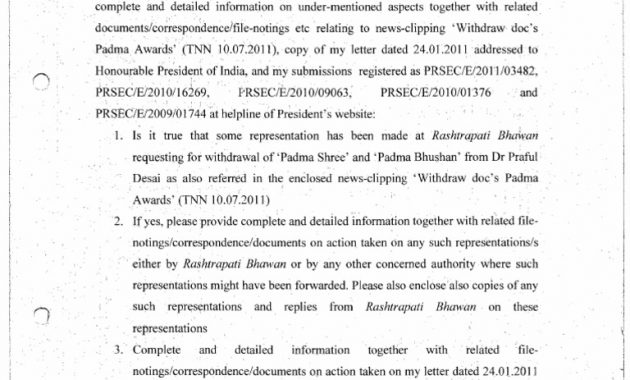Recommendation Letter For Padma Awards – The Padma Awards, one of India’s highest civilian honors, recognize exceptional achievements in various fields, from art and science to social work and public service. A crucial component of the nomination process is the recommendation letter. In this comprehensive guide, we will explore the steps to crafting an effective and persuasive Recommendation Letter for Padma Awards nominations and the nomination process, criteria, and tips for writing a successful letter.
Understanding the Padma Awards
Brief History and Significance
The Padma Awards were instituted in 1954 and are presented in three categories: Padma Vibhushan, Padma Bhushan, and Padma Shri. These awards aim to celebrate the spirit of selfless service and excellence, acknowledging individuals who have made remarkable contributions to society.
Categories and Criteria
- Padma Vibhushan: This award is conferred for exceptional and distinguished service in any field, including government service.
- Padma Bhushan: This award recognizes distinguished service of a high order in any field.
- Padma Shri: This award is given for outstanding service in any field.
Nomination Process Overview
The Padma Awards nomination process typically starts in May and ends in September, with the awards being announced on Republic Day (January 26th). Nominations can be submitted by individuals or organizations, but self-nominations are not accepted. A crucial aspect of the nomination is the Recommendation Letter for Padma Awards, which provides detailed information on the nominee’s achievements and why they deserve the honor.
Crafting an Impactful Recommendation Letter
Research on the Nominee’s Achievements
Before writing the letter, thoroughly researching the nominee’s accomplishments is essential. This includes their career milestones, awards, social impact, and other relevant achievements aligning with the Padma Awards criteria.
Structure of the Letter
- Salutation: Address the letter to the Padma Awards Committee, using a formal greeting like “Dear Padma Awards Committee Members.”
- Introduction and Relationship to the Nominee: Begin by introducing yourself and explaining your relationship to the nominee, establishing your credibility as a recommender.
- Overview of Nominee’s Accomplishments: Briefly summarize the nominee’s achievements in their field, emphasizing their most significant contributions.
- Specific Examples and Anecdotes: Offer detailed examples of the nominee’s accomplishments, including anecdotes demonstrating their dedication, passion, and impact on others.
- Conclusion and Endorsement: Conclude the letter by summarizing the nominee’s qualifications and strongly endorsing them for the Padma Award.
Language and Tone
The letter should be written in a formal and respectful tone, using clear and concise language. Be specific in your descriptions and avoid exaggeration, as credibility is crucial for a persuasive recommendation.
Tips for Making the Letter Persuasive
- Personalize the letter by sharing your unique perspective on the nominee’s achievements and character.
- Use quantifiable evidence, such as statistics or data, to support the nominee’s impact in their field.
- Highlight the nominee’s contributions to society and how they have gone above and beyond in their endeavors.
- Emphasize the nominee’s alignment with the Padma Awards criteria and mission.
- Proofread the letter carefully for grammar, spelling, and punctuation errors to ensure a polished and professional appearance.
Successful Padma Awards Recipients
To better understand the qualities of a successful recommendation letter, let’s examine brief profiles of notable Padma Awards recipients and insights into their letters.
Dr. A.P.J. Abdul Kalam, a renowned scientist and the 11th President of India, was awarded the Padma Bhushan, Padma Vibhushan, and Bharat Ratna. His recommendation letters highlighted his significant contributions to India’s space and defense programs and his dedication to inspiring the youth through education.
M.S. Subbulakshmi, a celebrated Carnatic vocalist, received the Padma Bhushan, Padma Vibhushan, and Bharat Ratna. Her letters showcased her exceptional talent, her long-lasting impact on Indian classical music, and her philanthropic efforts.
Kiran Bedi, the first woman to join the Indian Police Service, was awarded the Padma Shri for her outstanding contributions to law enforcement and public service. Her recommendation letters emphasized her unwavering dedication to justice, innovative policing initiatives, and women’s rights and empowerment advocacy.
By examining these profiles, we can discern that successful recommendation letters for Padma Awards nominees share specific qualities: they provide a clear and compelling narrative of the nominee’s achievements, demonstrate their societal impact, and establish a strong case for the nominee’s alignment with the award’s mission and criteria.
Conclusion
Crafting an impactful Recommendation Letter for Padma Awards is crucial to the nomination process. By understanding the nomination process, criteria, and tips for writing a persuasive letter, you can create a compelling case for your nominee. Remember to thoroughly research the nominee’s achievements, use a formal and respectful tone, provide specific examples and anecdotes, and emphasize the nominee’s alignment with the Padma Awards criteria.
As we’ve seen from successful Padma Awards recipients, a well-crafted recommendation letter can make all the difference in the nominee’s journey to receiving this prestigious honor. By following the guidelines presented in this guide, you will be well-equipped to nominate a deserving individual and contribute to celebrating excellence and selfless service.
If you enjoyed this comprehensive guide on crafting an impactful recommendation letter for Padma Awards, explore other informative articles on [Our Website] for more tips and insights on various topics. Click here to discover more valuable content that can help you make a difference in the world around you.
